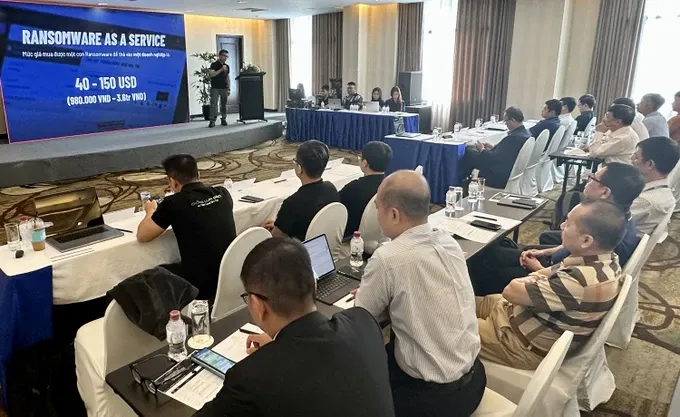
Deputy Director Tran Dang Khoa of the Information Security Authority (Ministry of Information and Communications) worriedly shared that the biggest threat is hackers are now using AI to create more sophisticated attacks, develop malware, scan for vulnerabilities, and bypass security measures to infiltrate information systems.
Many hackers are exploiting AI-based technologies to generate fake information that spreads on social media. Although government agencies have implemented many solutions, the use of AI to create scenarios and organize scams on social networks is very common, leading to many people being scammed and their property being stolen, causing social unrest," said Director Khoa.
Data security experts mentioned a worrying trend of using AI to create highly realistic fake profiles after collecting data from social media platforms and public websites, increasing the likelihood of success in phishing scams. Another challenge is that password security is becoming more difficult with the involvement of AI. Using machine learning tools, AI can analyze common passwords used by humans, find common patterns, and identify test patterns with high accuracy, significantly reducing cracking time.
Deputy Minister of Information and Communications Pham Duc Long said that AI technologies are performing tasks that used to be for humans only, rising the cunning level of cyberattacks and in turn a higher risk of information leak.
However, according to Saurabh Sharma, a security technologist at Kaspersky's Global Research and Analysis Team (GReAT) in the Asia-Pacific (APAC) region, if cybercriminals can exploit the power of AI, so can cybersecurity forces for prevention purposes. AI can be used to detect anomalies in activity, identify the security level of a log, and thus outline a typical security incident and suggest steps to find malware.
Yet as there are still limits in adopting AI-based methods for cybersecurity, it is necessary to record all AI interactions for evaluation and data storage purposes to serve cybersecurity efforts. Even with the convenience of automatically collecting data and improving problem solving time, machines cannot replace the brain of human beings.
Deputy Minister Pham Duc Long believes that to create a safe cyberspace and protect people from cyberattacks, there should be close collaboration among the whole society, from specialized agencies, information security service providers, and each individual in order to counter increasingly cunning and complex cybersecurity threats.
“In the era of booming AI technology and emerging technologies, state agencies and organizations need to implement a comprehensive review of the current status of information systems so that corresponding security measures can be effectively adopted," emphasized Deputy Minister Long.
Deputy Director Nguyen Anh Tuan of the National Population Data Center, Police Department for Administrative Management of Social Order (Ministry of Public Security) said that cybersecurity challenges from AI can include attacks through AI-powered malware, where hackers use special AI technologies to simulate systems to find vulnerabilities, or scammers use AI to make it difficult for many people to recognize.
To minimize the risks from such attacks, Vietnam needs to urgently complete the legal framework on AI; regulations on ethics in the development, production, application and use of AI in Vietnam; technical standards for systems that use, apply, connect and provide AI services; and technical standards for the platform of connection, sharing, application and use of AI.
It is also necessary to research and apply AI products to combat AI risks, considering cybersecurity and information security to avoid severe consequences of AI-based attacks.
CEO Nguyen Van Thu of Cybersecurity at Bkav commented that with the explosion of social networking applications today, it is not difficult for ill-minded people to collect a person's image and then create perfect fake copies with full personal biometric features to carry out illegal transactions, especially in the context of ChatGPT and AI developing very quickly as it is today. Internet users might also be lured to click on fake links, leading to sensitive data stealing for harmful purposes.
He advised that the community should be extremely careful conducting online financial transactions even with biometric authentication measures. Meanwhile, banks should continuously update their advanced technological solutions to increase security and fight against deepfake attacks.
According to Director Nguyen Thanh Nam of the Information Security Center of HPT Technology Co., every year, Vietnam has more than 10,000 cyberattacks, especially recent malware attacks on the network systems of businesses, causing great economic damage. Many large-scale attacks lately have caused economic damage to enterprises and leaked customer's personal information. The reason is that investment in information security is not at the right level. Many businesses and organizations do not even have the mechanisms and capital to invest in this field.
























